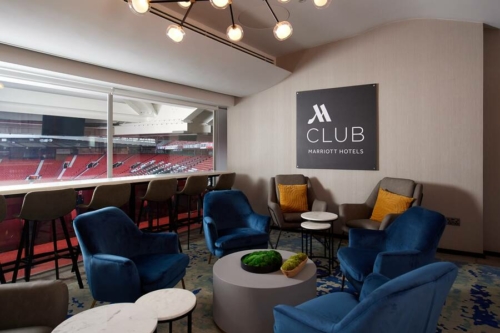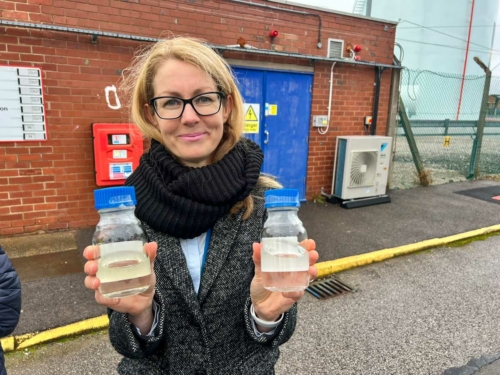Bits: Marriott and Man Utd part ways, Qatar / Yannick Alléno menus, KLM SAF surcharge
Links on Head for Points may support the site by paying a commission. See here for all partner links.
News in brief:
Marriott Bonvoy and Manchester United part ways
According to reports in the marketing press, Marriott Bonvoy and Manchester United have not renewed their sponsorship agreement.
This had been a fruitful partnership for Marriott Bonvoy members, with some impressive redemption opportunities available for games at Old Trafford. This included the M Club box, pictured below.
Malaysia Airways retains its partnership with the club, although this has never resulted in match tickets or any other benefits being available to Enrich frequent flyer members as far as I have seen.
With Virgin Red dropping its suite at the AO (Manchester) Arena, opportunities to burn your miles and points for ‘experiences’ redemptions outside London are shrinking.
Hilton’s new partnership with the Football Association should see some opportunities when the national teams are playing away from Wembley.

Qatar Airways partners with Yannick Alléno
Qatar Airways often appears to be on a mission to ensure that its product exceeds the competition in every respect. In the last year or so alone we’ve seen the deployment of ‘game changing’ Starlink wi-fi and the introduction of a caviar service in business class on selected flights from Doha.
(Rhys and I tried both of these on our recent trip to Doha, and both are outstanding.)
One thing that we both felt wasn’t totally world class on our trip was the restaurant in the First Class lounge in Doha. Whilst better than anything you’re ever going to get from a European airline, it wasn’t pushing any boundaries.
The airline clearly thinks the same and has signed a partnership with French chef Yannick Alléno.
The Al Safwa First Class lounge in Doha will now become (I think) the first mainstream airport lounge in the world to be overseen by a chef with a three Michelin star restaurant. I’m excluding Alain Ducasse in Paris because you can’t enter that lounge with status or on short haul tickets.
An offshoot of Pavyllon will be opened in the lounge. There is a Pavyllon in the Four Seasons London Park Lane hotel and the original in Paris holds three stars. (Yannick has 17 Michelin stars in total across his restaurants.)
According to the airline, it will be:
“offering diners a seat at the counter facing an open kitchen – a signature of Alléno’s ‘gastronomic counter’ concept.”
For those who are flying Qatar Airways to/from Paris, you will also find dishes from Yannick appearing in the lounge at Paris CDG as well as on First and Business Class menus.
You can find out more on the Qatar Airways website here.
KLM adds 100% SAF surcharge from London City
If you’ve noticed that KLM flights between London City and Amsterdam have become more expensive, here’s why.
As part of a trial, KLM is adding a €20 SAF surcharge to the cost of a one-way economy ticket in September (€30 for business class).
Sustainable aviation fuels (SAF) are produced in a variety of ways, from domestic waste, repurposing residual products such as cooking oil or even extracting carbon out of thin air (called eSAF) using renewable energy. The photo above shows conventional jet fuel (left) and SAF (right).
Although SAF emits roughly the same amount of CO₂ during a flight, the impact across the life cycle is at least 65% lower than traditional kerosene. You can find out more in my deep dive with Rolls-Royce here, including a look at the other benefits of SAF such as lower particulates and – potentially – fewer contrails.
At present, KLM applies a 2% SAF surcharge to all tickets as part of an EU mandate that all airlines use at least 2% SAF this year, rising to 6% in 2030 and 70% in 2050.
For two trial routes, KLM has temporarily increased this percentage to 100%. KLM says “The additional amount goes entirely towards the purchase of SAF” so this is a genuine pass-through, not a stealth price rise. Of course, the SAF use is mandated by law and your flight will NOT be using 100% SAF – the money will simply pay for the flight equivalent of SAF.
The trial only applies to flights in September on two routes:
- Amsterdam to London City
- Amsterdam to Hamburg
Coincidentally, these are some of the airline’s shortest flights.
During the trial, KLM says it is hoping to “assess passengers’ willingness to pay extra for SAF when it is automatically included in the ticket price”. Zita Schellekens, SVP Sustainability and Strategy adds: “Through this trial, we want to better understand passenger behaviour and examine the role sustainability plays in the decision-making process when purchasing a ticket.”


 Rhys
Rhys 






Comments (75)